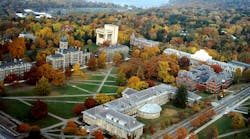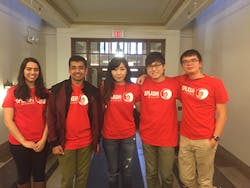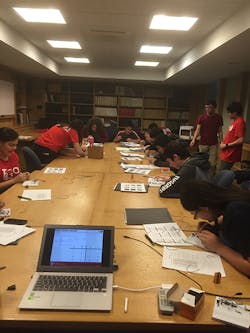Programs
Cornell Engineering’s School of Electrical and Computer Engineering Cornell University created the first Electrical Engineering department in the U.S. and to this day, this spirit of innovation and hands-on education remains in what is now the School of Electrical and Computer Engineering within the top ranked College of Engineering.
Electrical and Computer Engineering can mean many things in today’s world, and one of Cornell ECE’s main strengths is in its wide breadth of topics. A student in ECE can focus in digital and computer systems, embedded processors, digital signal processing, RF (wireless) systems, optical communications, energy and power engineering, solid-state electronics, integrated circuit design and fabrication, analog circuitry, bioelectrical devices and circuits, and biomedical applications. By giving students exposure to these topics and allowing them to specialize, Cornell ECE imparts its students with both breadth and depth of ECE knowledge. In a field as interdisciplinary as electrical and computer engineering, Cornell ECE prepares its students to tackle any problem they are presented with.
The foundation of Cornell ECE is its faculty. Faculty are not just experts and research leaders in their fields; they are very open resources for students. Professors and lecturers frequently have their doors open to inquisitive students, even outside regular office hours. Students are challenged to think about a topic’s implications beyond the course material. Cornell ECE faculty do not just teach the course material; they teach their students how to think and approach an engineering problem, and put in many hours to ensure this result.
At the very heart of Cornell ECE is its students. Cornell ECE is collaborative, with students who want to help each other understand what they are learning. Students are often assigned homework to be completed in groups, and labs are often conducted in teams. This provides the experience they need to succeed on teams after graduation. It is common to see students in the same class or lab helping each other through difficult assignments, even outside of their own groups. This collaborative atmosphere creates a program where the focus is on learning and becoming a better engineer, rather than a program where grades are the primary goal.
The students in Cornell ECE are also very active within student groups and project teams. With extremely active HKN and IEEE student chapters, the department is able to leverage its student population to create a better community and solicit feedback about making the department even better. Cornell ECE’s Maker Club inspires students to bring their own ideas to fruition, and with a new Maker Space, the culture of Cornell ECE will be more innovative than ever before. Student groups are an integral part of various activities throughout the year, whether corporate events, social occasions, student-professor interactions, or reaching out to the community and volunteering. Once a year on ECE Day, student groups and faculty have a large celebration, where students can take on their professors in a Jeopardy-type competition, dunk their professors in a dunk tank, or just chat with their professors informally. Cornell ECE students truly make the department a special place to be.
Overall, Cornell ECE’s academic offerings, combined with a caring, world-class faculty and an active, collaborative student body fulfill the school’s motto: Cornell ECEs can do everything. Cornell ECE is never complacent and is always trying to innovate. From the new Maker Space to the helpfulness of the faculty and staff, students truly learn how to engineer and approach problems. Students graduate from Cornell ECE with the belief that they can do everything, and can handle any challenge they are presented with.
About Cornell Engineering
Founded in 1870, Cornell Engineering is the preeminent engineering school in the Ivy League. The college has a long history of excellence in undergraduate and graduate education within the context of a uniquely broad and renowned research-intensive university. Its strengths have developed from a fearlessness to question established thinking, a genuine commitment to students, and a sincere desire to make the world a better place for all. Cornell Engineering faculty members dismantle conventional wisdom to discover new knowledge and invent transformative technology, develop innovative interdisciplinary research and programs, and teach students who will brighten our future.
Notable Projects and Labs
fab@home
The Fab@Home Project is an open-source mass-collaboration developing personal fabrication technology aimed at bringing personal fabrication to your home. Members include those who use their abilities to develop novel hardware, software and uses for digital fabricators and those who simply use it to make unique items. The Community includes hundreds of engineers, inventors, artists, students, and hobbyists across six continents.
Hod Lipson and Evan Malone of the Cornell University Computational Synthesis Laboratory began Fab@Home project in 2006. Within one year, the Fab@Home website received 17,000,000 hits and the project received a Popular Mechanics Breakthrough Award. Read more
Unshackling Evolution: Evolving Soft Robots with Multiple Materials and a Powerful Generative Encoding. Read More
View other Cornell Creative Machines Labs
Quick Facts
Engineering Undergraduate Enrollment, 3,339
Engineering Graduate Enrollment, 1,812
Engineering Programs
Undergraduate Majors, 13
Undergraduate Minors, 18
MS/PhD Fields, 16
Master of Engineering Fields, 15
Number of Faculty, 247
Number of living Alumni, 47,600
Profile created by Penton using resources found on the university website or material provided directly from the college. The intention of these profiles is to highlight some of the top electrical/computer and mechanical engineering programs in the United States. Source:https://www.engineering.cornell.edu/




